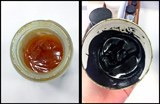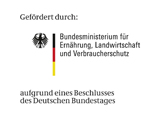AUFWIND: Sustainable kerosene made of algae oil
Production and utilization of algae-based fuels for aviation
In the future, aviation will increasingly count on biofuels. However, since - to date - only few raw materials exist for this area and since this industry has very specific requirements, biofuels have so far only been used in individual pilot projects in air traffic. The group project AUFWIND (a German term for up-current, or new impetus) is researching ways for algae production and conversion into aircraft fuels – in addition to the technical implementation, the focus is primarily on an economic and sustainable production of biokerosene. Fraunhofer UMSICHT is participating in this project with its analytical expertise in the area of algae extraction.
Biofuels are of increasing importance for future aviation. In the global society, air traffic is an important factor and cannot be replaced by anything in the future, either. As such, for aviation, in order to reduce its CO2 footprint, in addition to developing airplanes that are more fuel-efficient and have lower emissions, the focus is on the search for alternative, CO2-neutral fuel sources.
Bio-based kerosene is the only practicable alternative to fossil aircraft fuels
While alternative fuel and propulsion variants can be developed in a timely fashion for terrestrial traffic and the maritime sector, in aviation, only kerosene is usable for the foreseeable future. Therefore, bio-based kerosene is the only practicable alternative to fossil fuels.
Optimizing technology, economic framework conditions and economies of scale
In AUFWIND, the biomass basis consists of micro-algae. They feature a high productivity and can utilize carbon dioxide, e. g. from the flue gas of power plants, as raw material. Even though first conversion processes for biokerosene production and test flights with algae-based biofuel have illustrated the feasibility in general, these processes still need to be redesigned to be much more efficient. To do so, the technology, the economic framework conditions and the economies of scale need to be optimized.
AUFWIND therefore integrates the whole value-added chain, from biomass production all the way to the manufacturing of standardizable fuels in accordance with the ASTM (American Society for Testing and Materials). In this, a focus is placed on the economic and ecological feasibility of the individual process steps and of the overall chain.
For the first time, a sub-project is dealing with the independent comparison of multiple photo bioreactor technologies for the cultivation of algae. This way, it should be possible early on to derive statements regarding the economic and technical implementability under Central European conditions.
Fraunhofer UMSICHT analyzes the quality of the algae oil
In the subsequent step, the downstream processing, the lipids are extracted from the algae mass via different processes that need to be tested. At the Fraunhofer-Institute for Environmental, Safety and Energy Technology UMSICHT, the algae oil extracted will be analyzed with respect to its suitability as starting material for the subsequent conversion to biokerosene, explained Dr. Anna Fastabend, who is in charge of the sub-project at UMSICHT: "We received the algae oil from our project partners and check it for various quality parameters. For this analysis, suitable methods are being developed."
Sustainability in each step
The analysis of the sustainability of all process steps in the economic, ecological and social dimension is another core concern of the project: "As such, the potential for generating new value through ancillary products is investigated, as is the protection of raw materials through the use of renewable resources with high productivity at the lowest possible resource consumption", explains Dr. Andreas Müller, project coordinator at the Jülich research center, about the research project.
Scope of project and funding note
The Federal Ministry of Food, Agriculture and Consumer Protection (BMELV) is funding the project with € 5.75 million via its project management organization FNR (Fachagentur Nachwachsende Rohstoffe). Total funding for the project amounts to some € 7.4 million.
AUFWIND will run for 2.5 years and involves 12 group partners from science and industry.
The project partners at a glance:
- Forschungszentrum Jülich GmbH
- EADS Deutschland GmbH
- DBFZ Deutsches Biomasseforschungszentrum gemeinnützige GmbH
- NOVAgreen Projektmanagement GmbH
- Phytolutions GmbH
- Hochschule Lausitz
- OMV Deutschland GmbH
- RWTH Aachen University
- Technische Universität München
- Fraunhofer Institut UMSICHT
- VERBIO Vereinigte BioEnergie AG
- VERFAHRENSTECHNIK Schwedt GmbH
Additional information
Fraunhofer UMSICHT features a broad range of expertise in the are of biofuels and is also involved in the group project "Quality Assurance and Sustainability in the Provision of Biofuels for Aviation", or in short: QuaNaBioL, which started March 8, 2012.
Last modified:
 Fraunhofer Institute for Environmental, Safety and Energy Technology UMSICHT
Fraunhofer Institute for Environmental, Safety and Energy Technology UMSICHT
